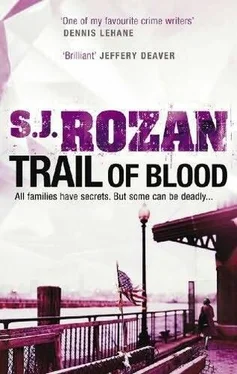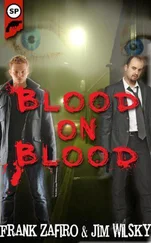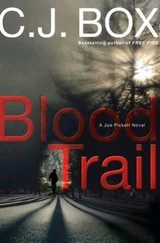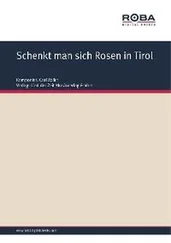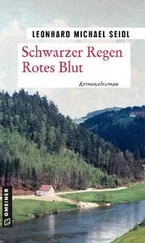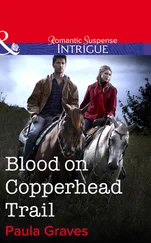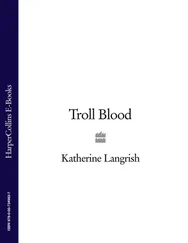S Rozan - Trail of Blood
Здесь есть возможность читать онлайн «S Rozan - Trail of Blood» весь текст электронной книги совершенно бесплатно (целиком полную версию без сокращений). В некоторых случаях можно слушать аудио, скачать через торрент в формате fb2 и присутствует краткое содержание. Жанр: Триллер, на английском языке. Описание произведения, (предисловие) а так же отзывы посетителей доступны на портале библиотеки ЛибКат.
- Название:Trail of Blood
- Автор:
- Жанр:
- Год:неизвестен
- ISBN:нет данных
- Рейтинг книги:5 / 5. Голосов: 1
-
Избранное:Добавить в избранное
- Отзывы:
-
Ваша оценка:
- 100
- 1
- 2
- 3
- 4
- 5
Trail of Blood: краткое содержание, описание и аннотация
Предлагаем к чтению аннотацию, описание, краткое содержание или предисловие (зависит от того, что написал сам автор книги «Trail of Blood»). Если вы не нашли необходимую информацию о книге — напишите в комментариях, мы постараемся отыскать её.
Trail of Blood — читать онлайн бесплатно полную книгу (весь текст) целиком
Ниже представлен текст книги, разбитый по страницам. Система сохранения места последней прочитанной страницы, позволяет с удобством читать онлайн бесплатно книгу «Trail of Blood», без необходимости каждый раз заново искать на чём Вы остановились. Поставьте закладку, и сможете в любой момент перейти на страницу, на которой закончили чтение.
Интервал:
Закладка:
We dropped anchor to await the turn of the tide. The kitchens put forth a sumptuous banquet of fish, goose, and dumplings. Not knowing what our situation would be from that moment forward, I ate my fill and encouraged Paul to do the same. (Though he needed no encouragement; as costly as this passage was, I don’t believe that in the end the Lloyd Triestino Line has made any profit on Paul.) Stewards stacked luggage on deck, and many emotional farewells and promises of continued friendship were made. Neither Paul nor I slept that night; had we, I believe we would have been the only passengers to do so.
As the sun rose the engines rumbled, and the ship was on the move. We made our way up the Whangpu, as the river is called where it flows through Shanghai. Though the fog was thick, we refugees once again jammed the rails, straining for a glimpse of our new home.
That “glimpse” came first not as sight, but as scent. Though “scent” is too gentle a word: This was a full-on reek, a riot of tangled odors that, had it been noise, would have deafened us all. Imagine, Mama, the sea at low tide; add diesel oil, rotting vegetables, and the smoke from a thousand factories, and stir into a haze of damp heat! Such was our first impression of our new home.
As the fog burned off we saw the shore. In contrast to the report of our noses, our eyes suggested a dreamlike scene. We floated past fields and rice paddies dotted with low huts and with farmers trudging behind what Kai-rong informs me are not oxen but water buffaloes. Soon, though, we approached the outskirts of Shanghai, and oh! what a disheartening sight! The area we passed, called Hongkew, suffered much in the Japanese invasion. The devastation, drifting smoke, and rubble, and the poor souls wandering through them, were not encouraging omens.
Next came the wharves. Junks, sampans, and rafts crowded the water, riding our wake or fearlessly crossing before us; how we failed to swamp them, I cannot say. On the docks all was chaos. Trucks loaded and unloaded and automobiles inched along. The rickshaw, that odd vehicle of the Orient, could be seen, with men pulling like horses at its rails. But the chief element of the boiling, eddying commotion was people, oh so many people! A few wore European dress, but most, both men and women, rushed or trudged or sat about in short trousers and conical hats. I felt dismay at the sight of such a dense and endless crowd; but also, a strange exhilaration that made me impatient to join them.
Next came into view grand buildings in the European style. The streets, though still bustling, became less frantic. Kai-rong gazed upon his home city for the first time in years. The light in his face strengthened my resolve to try to love this place.
Kai-rong informed us we had reached the Bund, a riverfront promenade lined with banks, office blocks, and grand hotels. This is the heart of the International Settlement, an area that by treaty is governed not by China but by the foreign powers whose subjects reside there. And this word is not our German Bund, as one might expect, but Hindustani, and meaning “dock.” (Do you see how much I’ve learned, in these few weeks? Though I haven’t yet learned to love Chinese sweets.)
Our engines quieted; we were met by pilot boats. Paul ran to join a group of friends his own age at the bow, to be the first to see our dock. Spying a garden along the Bund, I asked Kai-rong if it was as lovely as it appeared. He said he thought it must be, but he’s never been inside, as Chinese aren’t allowed.
Mama, my heart froze. I saw before me the “Jews Forbidden” sign at the gate of the Mirabell Garden the last time you and I tried to go for our accustomed Sunday stroll.
“But how can that be?” I was vehement, Mama; I think I wanted him to say he’d been making some odd joke, or I’d misunderstood. “How can that be? This is China! This area may be governed by foreigners, but surely they cannot-”
“They can. By treaty they can and for a hundred years they have. A mile behind that”-indicating the Bund-“and thousands of miles beyond, is China. The International Settlement and the French Concession might as well be Europe. Though I can tell you, Rosalie, I was never treated with as much disdain in Europe as I have been here in the city where I was born.”
This saddened me, Mama, more than I can say. Looking with dismay across the water, I asked whether he meant to tell me the international areas, so prosperous and attractive, are entirely closed to Chinese.
“Oh, by no means,” he answered with a wry smile. “Just this ‘public’ garden, and the gentleman’s clubs, sports clubs, and private dining establishments. A million people live in the International Settlement, half a million in the French Concession. Of those, if more than sixty thousand are European, well, then, as they say in England, I’m a Chinaman.”
I smiled also, and asked, “Sixty thousand people rule the lives of one and a half million?”
“But isn’t that how things are done everywhere? In China ’s treaty ports the disparity is sharp because the rulers are foreigners. But”-again sweeping his hand-“in those thousands of miles, for thousands of years, it’s been millions of peasants sweating and starving while aristocrats sip tea. In most of the world, the few govern the many.”
“Now, take care what you say, or you’ll be thought a Bolshevik.”
“Oh, hardly. In fact,” said he in ironic tones, “my own home is in the International Settlement. My father trades in cotton and silk, as his father did, and his. I’m expected to continue this dynasty.”
“Are you? And yet in your voice I hear something else.”
He turned to me, briefly silent, and quite somber. Then he smiled. “Your hearing is acute. Come, let’s find your brother. When the gangway is lowered, chaos will descend with it.”
Mama, I’m told the lights will soon be turned off in this place where we’re staying. I’m quite exhausted. I’ll end here and post this letter tomorrow, hoping it crosses the path of the ship on which you and Uncle Horst are steaming toward Shanghai right now! Though were I assured you were on such a ship and would never see this letter, I’d still continue my account. I’m oddly comforted by the attempt to decribe this extraordinary place for you. To envision your smile as you read makes me feel less alone than, surrounded by the crowds and ceaseless bustle in this room and in Shanghai, I know myself to be.
Your Rosalie
Crowds and ceaseless bustle. That was Chinatown; that was Mary and me and the thirty-six other kids in our tumultuous first-grade class; that was my parents, my mother’s older sister, and my four big brothers in our walk-up apartment. I wanted to tell Rosalie, Don’t worry, once you get used to it it’s kind of fun. I reached for the next letter; maybe she’d found that out herself. But my hand had to detour to pick up the ringing phone.
“Ms. Chin? This is Leah Pilarsky. Joel’s sister-in-law. I’m so sorry to bother you, but…”
“Please call me Lydia.” I wrenched myself back to this familiar room. “And you’re certainly not bothering me. Is something wrong?” Besides the obvious, I thought.
“That’s why I’m calling. I’m not sure you can help, but we don’t know where else to turn. It’s about-Joel’s body.” Her voice caught. “I’m sorry, it’s just such an odd thing to say, his body…” After a tiny pause she went on. “ Lydia, I don’t know if you know this, but our religious laws call for burial within twenty-four hours of death.”
“I think I did know that. But that’s already past.”
“Yes. We also prefer not to do autopsies, but in cases like this, the rabbis permit it. Our laws are ancient, but we do live in the modern world.” Her tone was ironic, almost amused. In better times she was probably the funny relative, full of mordant humor. She was also, clearly, the competent, steadfast one you turn to in times like this. “We’ve been told the autopsy’s been done. But they won’t release the body.”
Читать дальшеИнтервал:
Закладка:
Похожие книги на «Trail of Blood»
Представляем Вашему вниманию похожие книги на «Trail of Blood» списком для выбора. Мы отобрали схожую по названию и смыслу литературу в надежде предоставить читателям больше вариантов отыскать новые, интересные, ещё непрочитанные произведения.
Обсуждение, отзывы о книге «Trail of Blood» и просто собственные мнения читателей. Оставьте ваши комментарии, напишите, что Вы думаете о произведении, его смысле или главных героях. Укажите что конкретно понравилось, а что нет, и почему Вы так считаете.
